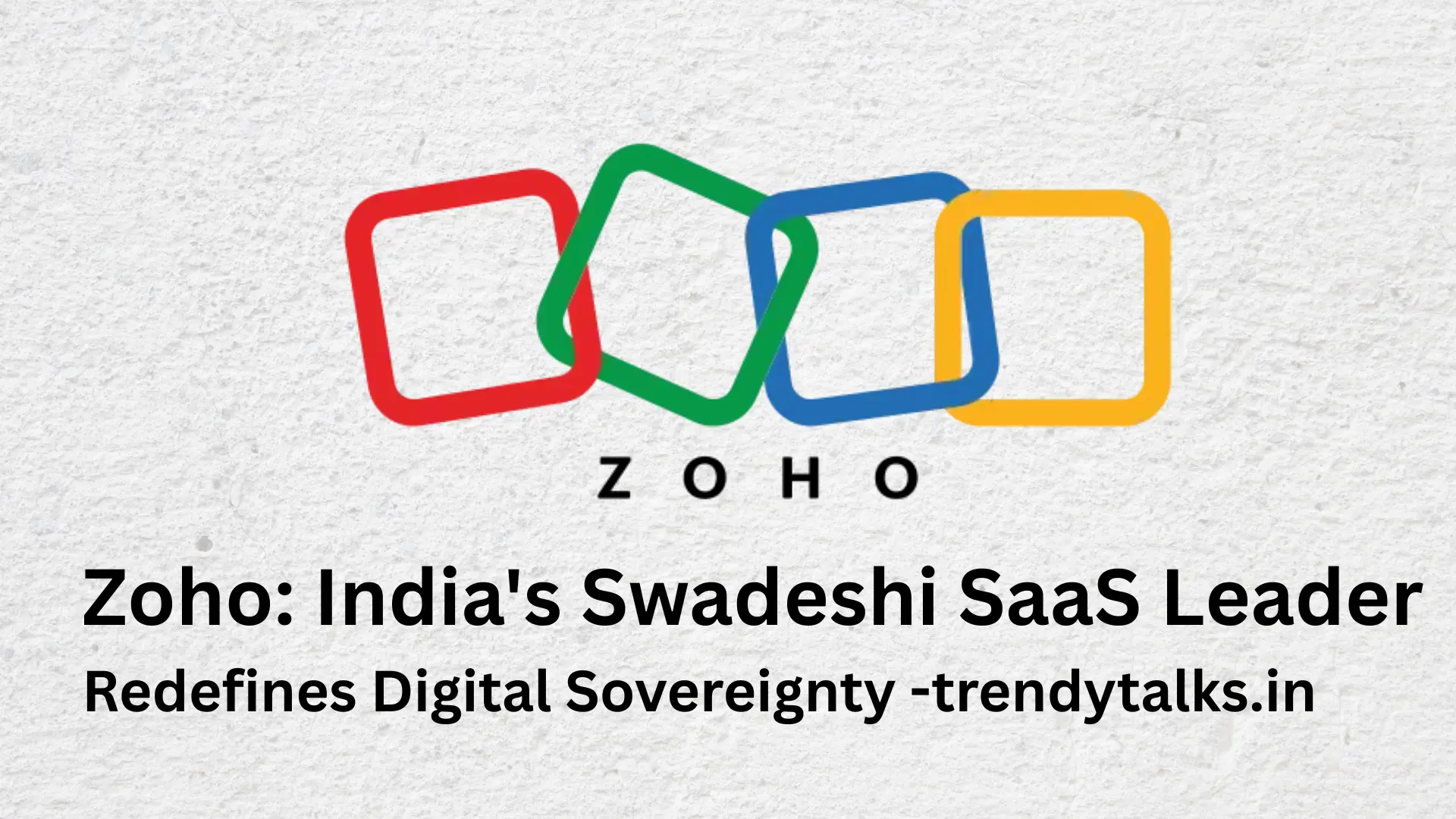Zoho: India's Swadeshi SaaS Leader Redefines Digital Sovereignty
Zoho, a leader in India’s Software-as-a-Service (SaaS) sector, is redefining the country’s technological self-reliance. Founded in 1996 by Sridhar Vembu and Tony Thomas, this company has built a global empire with over 100 million users. By focusing on data localization, rural development, and empowering small and medium businesses (SMBs), Zoho demonstrates that global-scale innovation can originate from Indian soil. This business model aligns directly with the “Aatmanirbhar Bharat” (self-reliant India) initiative while successfully competing against multinational giants like Microsoft and Salesforce.

Here, we try to explore how Zoho’s growth embodies India’s ambition for technological sovereignty. From its unique rural R&D hubs to its commitment to data privacy and an AI-driven future, Zoho has challenged the narrative that innovation is a Western monopoly. It serves as a blueprint for India’s digital destiny, proving that a homegrown platform can achieve global success without losing its roots.
Why Does a "Swadeshi" SaaS Platform Matter for India?
How Zoho's Vision Aligns with Aatmanirbhar Bharat
Zoho’s origin story, led by co-founder Sridhar Vembu, is rooted in an India-first innovation philosophy. Unlike peers who sought validation from Silicon Valley, Zoho built its own pipeline of talent through initiatives like Zoho University, which trains students from non-metro and rural backgrounds. This grassroots approach not only creates a self-reliant digital ecosystem but also aligns with the government’s Digital India and Aatmanirbhar Bharat missions, which aim to reduce reliance on foreign technology and build indigenous capabilities.
In a powerful endorsement of this vision, Union Minister Ashwini Vaishnaw recently announced on X (formerly Twitter) that he is moving to Zoho’s suite for his official work, stating, “I am moving to Zoho — our own Swadeshi platform for documents, spreadsheets & presentations. I urge all to join PM Shri @narendramodi Ji’s call for Swadeshi by adopting indigenous products & services.” This high-profile adoption sends a clear message about the government’s confidence in indigenous technology.
I am moving to Zoho — our own Swadeshi platform for documents, spreadsheets & presentations. 🇮🇳
— Ashwini Vaishnaw (@AshwiniVaishnaw) September 22, 2025
I urge all to join PM Shri @narendramodi Ji’s call for Swadeshi by adopting indigenous products & services. pic.twitter.com/k3nu7bkB1S
What are the Key Differences Between Zoho and Foreign SaaS Providers?
While global platforms are often priced in dollars, making them expensive for Indian SMBs, Zoho offers affordable, rupee-priced solutions. Furthermore, its commitment to data localization and compliance with India’s Digital Personal Data Protection (DPDP) Act addresses sovereignty and security concerns that foreign data storage policies may raise. This gives Indian businesses a significant economic and security advantage.
Growth & Impact: By the Numbers
How Big is India’s SaaS Market and What is Zoho’s Market Share?
India’s Software-as-a-Service (SaaS) industry is on course to touch the $50 billion milestone by 2030, according to market projections. With over 100 million global users across more than 55 business applications, Zoho is a key player in this growth. India is its fastest-growing market, with a strong focus on SMBs.
How Does Zoho’s Rural-First Model Drive Development?
Zoho has deliberately invested in Tier-2 and Tier-3 towns, setting up R&D centers in places like Tenkasi and Renigunta. This strategy not only creates thousands of local jobs but also helps curb urban migration and fosters sustainable tech ecosystems in smaller communities.
Zoho’s Investment in Artificial Intelligence (AI)
To remain competitive, Zoho has heavily invested in AI. Its Zia AI agent provides intelligent insights for CRM and analytics, and the launch of the Ulaa Enterprise Browser offers a privacy-first alternative to mainstream browsers. These innovations position Zoho as a global innovator, not just an Indian competitor.
FAQs
Q1: Why is Zoho called a swadeshi platform?
Zoho is founded and headquartered in India, develops its products in-house, hires local talent, and prioritizes data localization, making it a truly swadeshi SaaS company.
Q2: How does Zoho support small businesses in India?
Zoho offers affordable SaaS tools like Zoho Books and Zoho CRM, reducing reliance on costly foreign software and helping SMBs digitize operations efficiently.
Q3: What is Zoho’s approach to data privacy?
Zoho follows a strict no-ads, no-data resale policy. Customer data is stored securely, aligned with India’s DPDP Act, ensuring transparency and control.
Q4: How does Zoho contribute to rural India?
Through Zoho University and R&D centers in Tier-2 towns, Zoho creates rural employment, develops local talent, and reduces migration pressures.
Q5: How does Zoho compare to Salesforce or Microsoft?
Zoho offers cost-effective, India-compliant solutions with better data control, while Salesforce and Microsoft focus more on enterprise-level, dollar-priced markets.
The Social Impact: Zoho & The SMB Ecosystem
For India’s 63 million SMBs, digital transformation is crucial for survival. Zoho’s user-friendly applications like Zoho Books and Zoho CRM enable small businesses to manage operations efficiently without the high costs of IT overheads. The company’s no-ads, no-data resale philosophy also provides a level of data privacy that resonates with businesses as India’s data protection laws become stricter.



